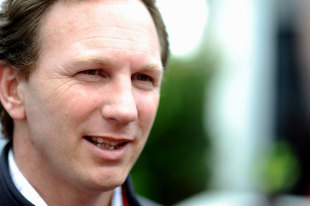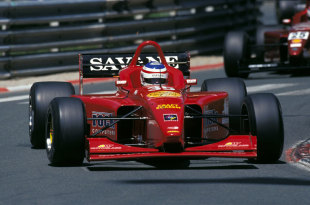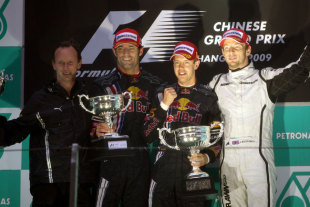
The last three seasons have seen one team stand on the top step of the podium more times than McLaren and Ferrari combined. Eight years ago, that same team didn't exist. When Red Bull made its debut in 2005, Christian Horner was overseeing his first grand prix at the age of 31 alongside the likes of Jean Todt at Ferrari and Ron Dennis at McLaren.
Getting a seat at the top table at such a young age was far from a case of luck, as Horner had to sacrifice his own racing career. In 1997 he set up and raced for Arden in F3000, but it wasn't an easy start. Horner failed to qualify for six of the 10 rounds and heading to the final race in Jerez his best result was a 17th place finish at Mugello. Having qualified 24th, Horner ended the season with an encouraging sixth place and a solitary point.
The following year saw better qualifying results but no points, and Horner decided his future was not going to be behind the wheel.
"At that point I'd effectively just retired from being a driver and my aspirations were to achieve success in the sport and to take at that point the Arden team to success," Horner said. "The chosen championship was Formula 3000 and I was determined to make the team effectively a team that I would have liked to have driven for and lead it to success."

It took a while for that success to come, with the team failing to score in 1999. In 2000 it won the Euro F3000 title and a refreshed driver line-up of Tomas Enge and Bjorn Wirdheim ensured the big results arrive in 2002. Although Enge's title was revoked after he failed a drugs test, three consecutive team championships meant Horner felt ready for Formula One when Red Bull came calling.
"The Arden team had dominated the championship; 2002 we won the constructors' and we won the drivers as well that year, we won again in 2003, we won again in 2004 in a record-breaking season and I was looking to make the next move in to Formula One. Initially I was looking to do it with the Arden team if there was an opportunity to move the team in to Formula One, but as you looked at that it became more and more obvious that there wasn't. So I'd started a relationship with Red Bull with the junior program - I'd known Helmut Marko for some time through Formula 3000 days - and then I was asked by Dietrich Mateschitz to join the team right at the beginning, which had great appeal to me to get involved in something right at the beginning at that stage."
Mateschitz may have had a history in the sport as a sponsor, but bankrolling his own team was always going to put pressure on his chosen team principal. While Horner admits that Mateschitz had high expectations, he was given realistic targets as he found his feet in the paddock.
"[Mateschitz] always had great vision as to what the long term aim was, but the immediate aim was to score I think 10 points, which was ... Jaguar had scored nine the previous season! And we scored 34 that year. But it was always clear his vision was not just to take part it was to win, and win in a different manner and as an independent. Then it was a question of getting the right people in the right places, the right structure, the right process and right organisation in place to be able to achieve that."
While "the right people" may result in a shortlist for a number of positions, when it came to the chief designer there was only one man for the job: Adrian Newey. For 2006 Horner had recruited the best in the business, so did the addition of Newey increase the pressure on him?
"Yes and no. We managed to persuade Adrian to join the team but we weren't anywhere near ready for him. We didn't have the tools, the equipment, but that was part of what appealed to him. So it was a matter of he joined in the building process, and really at the grassroots of the team. I think perhaps he didn't envisage before he joined how big a task that was going to be. But he was enthusiastic about the values of Red Bull, liked what he saw, we immediately struck up a good relationship and focused very hard on building a team and getting the right people around him."
After further building and the embarrassment of Toro Rosso winning before Red Bull had, the team's big opportunity arrived with the new regulations of 2009. Newey was comfortable in his role, the right tools were at his disposal and Horner identified this blank canvas as the opportunity to break in to the front runners.
"I think it provided that opportunity to say 'OK here's a clean set of rules, it's down to the teams to go away and interpret them' and the car that we turned up with at the first test looked very different to a lot of others.

"It was very satisfying. 2009 saw a huge regulation change which enabled the team to demonstrate its strength with a clean sheet of paper for all the teams. Despite the double-diffuser - which created some trepidation that year - it was a phenomenal year for the team. To win six grands prix, four one-two finishes, just miss out on the driver and team championships was a phenomenal year but it left us hungry and wanting more."
More is exactly what Red Bull got. Vettel's second championship was a dominant display by both the team and driver, but such is the make-up of the team that it continues to live up to the name and Horner just wants the adrenaline rush of victory even more.
"When you've won a double world championship and had the type of season, or three seasons we've had - we've won 27 grands prix in the last three years, four world championships - it's been a phenomenal period for the team and that's left us hungry to want more. We're still a very young team; this is only our eighth car and we're only entering our eighth season and the team is very hungry to build on the success we've achieved."
So how will he go about surpassing 2011, especially in the face of an increased challenge from McLaren, Mercedes and Lotus? Simple: don't change a thing.
"It's all about what we do on the track. The whole factory, the whole team is focused on building on the performances we achieved last year. We've had continuity across the group for several years now and that's invaluable and I think we'll look to build on the kind of success that we've achieved in the last few years."
Chris Medland is assistant editor at ESPNF1
© ESPN Sports Media Ltd.
 Chris Medland is assistant editor at ESPNF1 Chris Medland, who in his youth even found the Pacific GPs entertaining, talked his way in to work at the British Grand Prix and was somehow retained for three years. He also worked on the BBC's F1 output prior to becoming assistant editor ahead of the 2011 season
Chris Medland is assistant editor at ESPNF1 Chris Medland, who in his youth even found the Pacific GPs entertaining, talked his way in to work at the British Grand Prix and was somehow retained for three years. He also worked on the BBC's F1 output prior to becoming assistant editor ahead of the 2011 season

